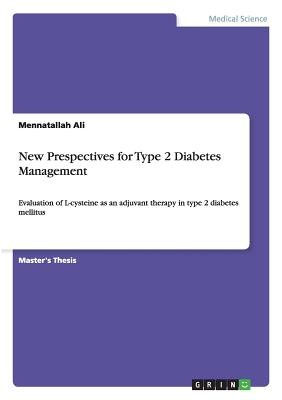
- We will send in 10–14 business days.
- Author: Mennatallah Ali
- Publisher: GRIN Verlag
- Year: 2014
- Pages: 252
- ISBN-10: 3656636877
- ISBN-13: 9783656636878
- Format: 14.8 x 21 x 1.5 cm, softcover
- Language: English
- SAVE -10% with code: EXTRA
Reviews
Description
Master's Thesis from the year 2012 in the subject Medicine - Therapy, grade: A, University of Alexandria (Medical Research Institute - Alexandria University), language: English, abstract: Increasing evidence has established causative links between obesity, chronic inflammation and insulin resistance; the core pathophysiological feature in type 2 diabetes mellitus. This study was designed to examine whether the combination of L-cysteine and metformin would provide additional benefits in reducing oxidative stress, inflammation and insulin resistance in streptozotocin-induced type 2 diabetes in rats. Male Wistar rats were fed a high-fat diet (HFD) for 8 weeks to induce insulin resistance, after which they were rendered diabetic with low-dose streptozotocin. Diabetic rats were treated with metformin (300 mg/kg/day), L-cysteine (300 mg/kg/day) and their combination along with HFD for another 2 weeks. Control rats were fed normal rat chow throughout the experiment. At the end of treatment, fasting blood glucose, fasting serum insulin, homeostasis model assessment-insulin resistance index (HOMA-IR) and serum free fatty acids (FFAs) were measured. Serum levels of the inflammatory markers; monocyte chemoattractant protein-1 (MCP-1), C-reactive protein (CRP) and nitrite/nitrate were also determined. The liver was isolated and used for determination of malondialdehyde (MDA), reduced glutathione (GSH), caspase-3 and cytochrome c levels. The hypoglycemic effect of the combination therapy exceeded that of metformin and L-cysteine monotherapies with more improvement in insulin resistance. All treated groups exhibited significant reductions in serum FFAs, oxidative stress and inflammatory parameters, caspase-3 and cytochrome c levels compared to untreated diabetic rats with the highest improvement observed in the combination group. In conclusion, the present results clearly suggest that L-cysteine can be strongly considered as an adjunct to metformin in management of type 2 diabet
EXTRA 10 % discount with code: EXTRA
The promotion ends in 18d.22:50:18
The discount code is valid when purchasing from 10 €. Discounts do not stack.
- Author: Mennatallah Ali
- Publisher: GRIN Verlag
- Year: 2014
- Pages: 252
- ISBN-10: 3656636877
- ISBN-13: 9783656636878
- Format: 14.8 x 21 x 1.5 cm, softcover
- Language: English English
Master's Thesis from the year 2012 in the subject Medicine - Therapy, grade: A, University of Alexandria (Medical Research Institute - Alexandria University), language: English, abstract: Increasing evidence has established causative links between obesity, chronic inflammation and insulin resistance; the core pathophysiological feature in type 2 diabetes mellitus. This study was designed to examine whether the combination of L-cysteine and metformin would provide additional benefits in reducing oxidative stress, inflammation and insulin resistance in streptozotocin-induced type 2 diabetes in rats. Male Wistar rats were fed a high-fat diet (HFD) for 8 weeks to induce insulin resistance, after which they were rendered diabetic with low-dose streptozotocin. Diabetic rats were treated with metformin (300 mg/kg/day), L-cysteine (300 mg/kg/day) and their combination along with HFD for another 2 weeks. Control rats were fed normal rat chow throughout the experiment. At the end of treatment, fasting blood glucose, fasting serum insulin, homeostasis model assessment-insulin resistance index (HOMA-IR) and serum free fatty acids (FFAs) were measured. Serum levels of the inflammatory markers; monocyte chemoattractant protein-1 (MCP-1), C-reactive protein (CRP) and nitrite/nitrate were also determined. The liver was isolated and used for determination of malondialdehyde (MDA), reduced glutathione (GSH), caspase-3 and cytochrome c levels. The hypoglycemic effect of the combination therapy exceeded that of metformin and L-cysteine monotherapies with more improvement in insulin resistance. All treated groups exhibited significant reductions in serum FFAs, oxidative stress and inflammatory parameters, caspase-3 and cytochrome c levels compared to untreated diabetic rats with the highest improvement observed in the combination group. In conclusion, the present results clearly suggest that L-cysteine can be strongly considered as an adjunct to metformin in management of type 2 diabet


Reviews